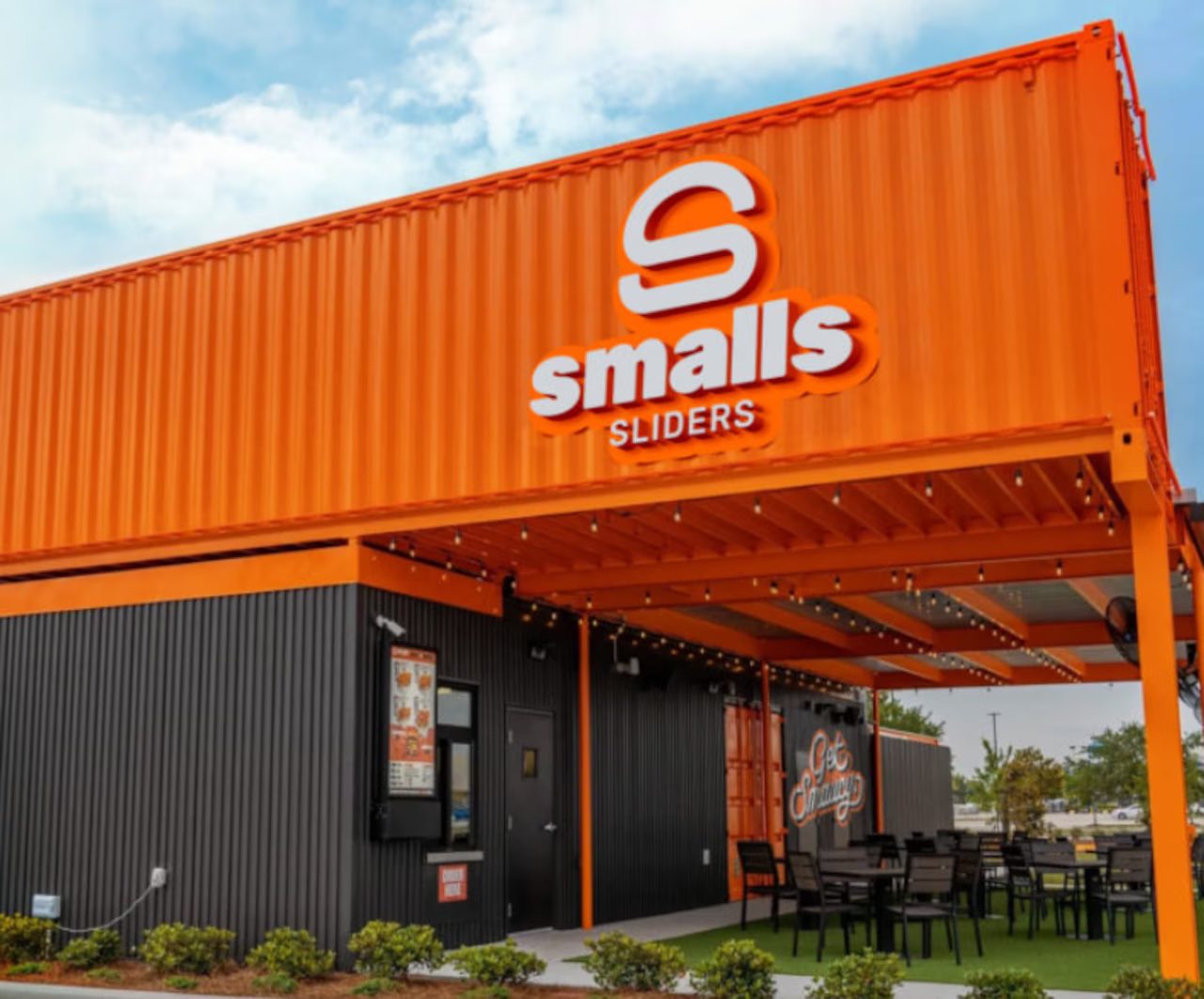CDO Don Crocker said the strategy will better inform the company on how to help its franchisees.

June 24, 2024
Smalls Sliders has made plenty of headlines since it burst onto the scene in 2019, most of which have covered the chain’s ambitious growth plans. Since, the Atlanta-based company – which differentiates itself through its simple menu (cheeseburger sliders, fries, shakes), its modular, or “can,” prototype, and its distinct branding anchored by its very own “Smorange” pantone color – has put a new leadership team into place and has built up a roster than includes 250 locations that are now open or under development.
The company has gone from 0 to 60 quick, in other words, but it is planning to push the accelerator even harder, today announcing it will add company-owned restaurants to its development pipeline to complement existing franchisee locations and plans. The idea to add a company-owned portfolio has been in the works for some time but is now executable after the April hiring of Don Crocker as Smalls’ chief development officer.
During a recent interview, Crocker said there are several reasons why Smalls is adding company-owned locations. First, it will accelerate the growth and momentum of the brand even more.
“Two, it affords us an opportunity to come alongside, shoulder-to-shoulder, with franchisees and learn and grow together,” he said. “In the thought of refinement and improving ourselves, to get better alongside franchisees is a powerful thing.”
Crocker adds that Smalls currently has over 40 active developers in the system with a pipeline of projects in a variety of stages throughout 18 states. Those projects, and the company’s franchisees, will remain a priority despite this added component, he said.
The final reason Smalls is adding company-owned locations is to provide an enthusiastic vote of confidence in the system’s business model. According to Smalls’ most recent FDD, average unit volumes exceeded $2 million, for instance, while the overall operating costs of the 800-ish-square-foot cans are lower than traditional QSR locations.
“This is a testament to us believing in the business and the relevance of our four-wall economics,” Crocker said. “We’re putting our capital behind this model and investing in the brand and that says quite a bit of our belief and commitment to what we’re doing.”
To get this company-owned strategy off the ground, Crocker said the company had to develop a framework, allocate capital, and add more operations and development resources. This process continues ahead of the company’s anticipated launch of company-owned cans in 2025, starting in Georgia.
“When you’re embarking upon a strategic initiative like this, it’s a little bit like peeling back an onion. There are layers and longer-term perspectives, and we have to truly commit to this over time,” he said. “It’s incumbent on us to develop all the framework and not just allocate money and build and open new restaurants.”
Launching such an initiative, he adds, can feel a bit daunting – the where, who, when, how. But Smalls is prioritizing its company-owned locations in markets that don’t have active franchise developers but do have operational adjacencies. Crocker said it’s important to have operational support relative to geography versus “a disparate shotgun approach.”
“We have to be thoughtful and connect the dots and make sure it makes sense from a support standpoint,” he said. “We also have to take into account where we’re not located and then create a framework there. Then it all starts to come to life and make more sense.”
That’s why Smalls is targeting Georgia, Tennessee, Florida, and South Carolina as its initial markets for company-owned locations. The company, which plans to have 40 franchised locations open by the end of this year, already has agreements in place in those locations.
As of now, there is no set goal on how many company-owned locations Smalls will open. Crocker made it a point to note that its strategy could change once the initial locations are open. Therein lies the point; making decisions in a real restaurant environment with a PnL (income statement) is much more effective in helping franchisee performance than making decisions in a test kitchen.
“We’ll look at the PnL holistically top to bottom, and then we’ll be able to work closely with our franchisees and operations team to put forth refinements and best practices, especially focusing on labor and food costs,” Crocker said. “It’s all about isolating opportunities to get better at the end of the day. We’re doing this to accelerate development and build the brand and test and learn. But the rationale is also to make money. Any conversation with a franchisee should focus on this general concept – how do we put more money in your pocket?”
Source: Nation’s Restaurant News
